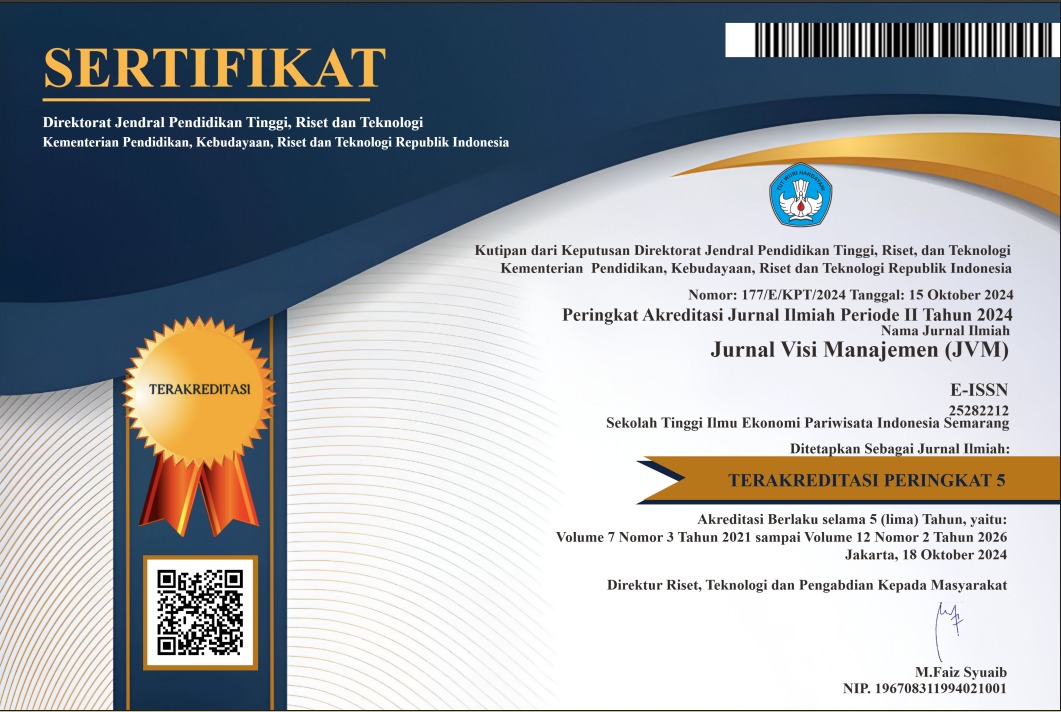Management Qur'anic Healing as a Complement to Medical Therapy
DOI:
https://doi.org/10.56910/jvm.v10i2.519Keywords:
Healing, Qur’anic, ManagementAbstract
Background: Present day clinical remedies are only symptomatic, requiring complementary therapies to cure the patient. Purpose: The reason of this have a look at is to find out how analyzing and being attentive to the Qur'an is used as remedy or Qur'anic remarkable recovery. Methods: This studies makes use of a qualitative technique with a form of library studies (look at Library). Results: The first studies degree explains the meaning of reading and listening in addition to the manners in studying and taking note of Qur'an. The second one degree is set the idea of Qur'anic wonderful restoration, 0.33 level is explaining the shortcomings and blessings of Qur'anic first-rate recovery to complement clinical therapy. The remaining stage closes with conclusions and hints. Conclusion: Taking note of the Qur'an as a therapy by analyzing the verses of the Qur'an with fami bi shaqin or Qur'anic tremendous recuperation technique, the verse signals that we see will input the mind then the meaning of the verse occurs. The interpretation of the verse that is seen contains the content of spiritual values in the Al-Qur'an surah which teaches a positive attitude that recognizes Allah, gratitude, compassion, optimism, humility, and mental toughness in facing trials from Allah SWT will be processed in the brain in such a way as to produce positive reactions that make a person steadfast and optimistic so that health conditions improve.
References
Aprilini, M., Mansyur, A., & Rifdah, A. (2019). Efektivitas mendengarkan murottal Al-Qur'an dalam menurunkan tingkat insomnia pada mahasiswa. Jurnal Psikologi Islami, 1(2), 146–154.
Faradisi, F. (2024). Mengatasi rasa sakit dengan suara: Keajaiban murrotal Al-Qur'an dalam penurunan nyeri dan kecemasan. Jakarta: NEM.
Hariandi, A. (2019). Strategi guru dalam meningkatkan membaca Al-Qur'an siswa di SDIT Aulia Batanghari. Jurnal Gentala Pendidikan Dasar, 4(1), 10–21.
Hasibullah, M. (2023). Pengembangan seni membaca Al-Qur'an dengan metode tartil dan tilawah pada santri di Pesantren Miftahul Ulum. Jurnal Al-Ijtima, 2(3), 318–327.
Ilyas, M. (2020). Metode muraja'ah dalam menjaga hafalan Al-Qur'an. Jurnal Al-Liqo', 1(5), 1–24.
Jiyanto, W. (2019). Implementasi metode Fami Bi Syauqin dalam memelihara hafalan Al-Qur'an pada hufadz di Ma'had Tahfidzul Qur'an. Jurnal Studi Al-Qur'an, 2(15), 185–200.
Khalifah, S. N., & Lutfiah, N. (2016). Religiopsikoneuroimunologi Al-Qur'an. Jurnal Psikologi UGM, 1(18), 19–28.
Mas’udi, & Istiqomah. (2017). Terapi Qur'ani bagi penyembuhan gangguan kejiwaan. Jurnal Bimbingan Konseling Islam, 1(8), 133–150.
Mulyono, P. (2016). Terapi holistik bagi penyembuhan penyakit. Jurnal The Shine Cahaya Dunia Keperawatan, 2(1), 1–10.
Na'im, M. A., & Fatah, A. (2023). Comparative study of waqf signs between the Qur’anic manuscripts. Jurnal Kajian Al-Qur'an dan Tafsir Al-Misykah, 14(1), 1–14.
Namuwali, D. (2017). Pengaruh teknik relaksasi nafas pada penderita TB paru di Balai Kesehatan Paru Masyarakat (BKPM) Magelang. Jurnal Info Kesehatan, 15(1), 1–15.
Pasmadi, A. (2021). Keutamaan dan adab terhadap Al-Qur'an. Jurnal Didaktika, 2(12), 133–151.
Pedak, M. (2010). Qur'an super healing (1st ed.). Semarang: Pustaka Nun.
Pedak, M. (2024). Mukjizat terapi Al-Qur'an untuk kesuksesan hidup (1st ed.). Semarang: Wahyu Media.
Rahmah, M. (2019). Sufi healing dan neuro-linguistic programming. Jurnal SYI'AR, 2(2), 104–123.
Ridwan, R., et al. (2022). Pengaruh mendengarkan murottal Al-Qur'an terhadap peningkatan kemampuan konsentrasi pada santriwati Madrasah Aliyah. Jurnal Medical Facumi, 2(2), 811–818.
Rosyanti, L., & Akhmad, A. (2022). Kesehatan spiritual: Terapi Al-Qur'an sebagai pengobatan fisik dan psikologis. Jurnal Health, 1(8), 89–114.
Warsono, W., & Y., F. (2016). Peran latihan pernafasan terhadap nilai kapasitas vital baru. Jurnal Ilmiah Ilmu Kesehatan, 3(4), 132–148.
Wihartati, W. (2022). Psikologi kesehatan berbasis unity of science (1st ed.). Yogyakarta: Lawwana.
Yunus, E., Arismunandar, P., & Rukanta, D. (2021). Pengaruh mendengarkan murottal Al-Qur'an terhadap tingkat stres orang dewasa. Jurnal Integrasi Kesehatan & Sains, 1(3), 110–119.







